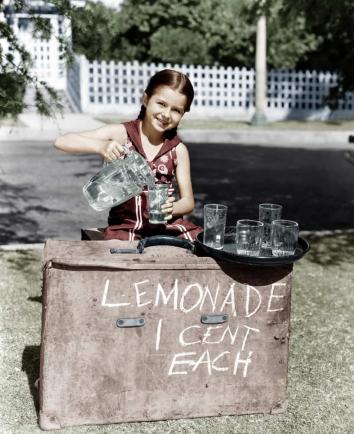
I don't need to look at a socio-economic graph or statistics about the 1970's poverty rate to know that my family was poor. There were a lot of us: 5 kids and 2 parents living in tight quarters. In fact, quarters that used to house horses. (Our home was a converted horse stable.) My Dad was the primary wage earner, and he worked long, hard hours at a dangerous job that was prone to lay-offs when business got slow. As kids, we were no strangers to free lunch tickets, "Government Cheese" and the occasional food stamps when times were really tough.
It's evident what the unpleasant side effects are about being poor. It's no fun dwelling on the negatives: worried, stressed-out parents, penny-pinching, late fines and over due notices. What's not as clear, are the positives associated with growing up broke. Here are some things I've come to recognize as pros to my underprivileged upbringing.
1. We learned to share
We shared bedrooms, beds, belongings and bike. (Singular bike). We had one bike between all of us kids for the longest time. That was the norm, and that was OK. We learned to take turns and enjoy watching each others turns. It didn't always have to be about "me". A lot of our bike time was devoted to watching our older brother put on "Evil Knievel" shows. We loved those death-defying exhibitions. It was entertainment at its best.
2. We used our imaginations
We didn't own much, so we imagined everything. We didn't have a traditional swing set, so we conjured up our own in the back of our property amidst a small grove of snarled, tangled trees. We had monkey bars, a see-saw and hanging vines to swing from. We were wild things straight out of the "Jungle Book".
3. We weren't materialistic
It was a rare occasion that we were given anything brand new. We were used to getting hand-me-downs, and we appreciated them. When an aunt sent over a brown paper bag filled with neatly folded clothes passed down from a cousin, we were delighted. It was always a little like Christmas opening up those troves. Much of our clothes shopping occurred at secondhand stores. We learned to look for good bargains, and we enjoyed the hunt.
4. We weren't greedy
Children love their parents. We knew our parents didn't have very much money, so we didn't want to remind them of it by constantly asking them for things we knew they couldn't afford. We learned humility. We were happy with smaller, simpler things. When we did receive something we really, really appreciated it. We knew what cost, thought and effort went into purchasing or making it, and we were grateful.
5. We learned to work
If we wanted something, we worked for it. We picked strawberries by the pound in the summer for extra money and cherries and blackberries by the bucket for snacks and cobbler. When we were younger, we spent a lot of our time sitting at our plywood built, Kool-aid stand trying to drum up business (which always proved difficult since we lived at the end of a very rural road). Our Dad was usually our only customer, coming home from work, and often paying with an IOU. We loved him for it.
As parents, we always want the best for our children. Generally we associate the best with "what money can buy". Ofttimes I reflect on my childhood and think I was actuallyenrichedwith experiences that helped me to look at the world through eyes of compassion, humility and creativity. There are excessively rich blessings born of desperately poor homes.
"The gem cannot be polished without friction, nor man perfected without trials." (Chinese Proverb)

